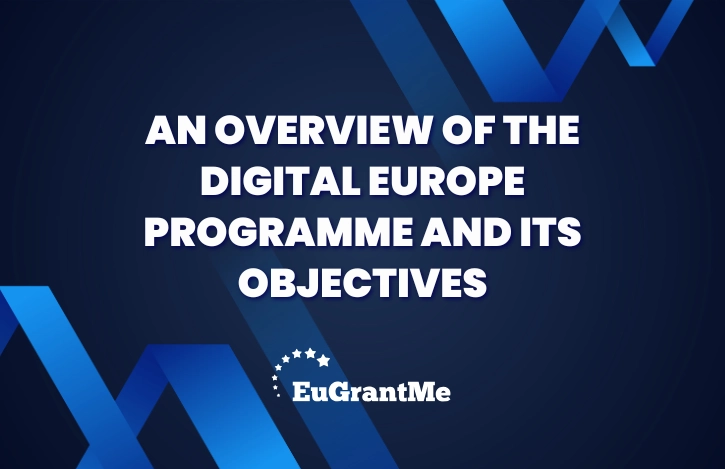The Digital Europe Programme is a key EU initiative designed to accelerate digital transformation across industries and public services. It supports the adoption of advanced technologies, enhances digital skills, and strengthens cybersecurity. By funding strategic projects, the programme ensures that businesses and governments can harness digital innovation effectively.
Digitalisation is essential for Europe’s economic growth and global competitiveness. The programme helps bridge the digital divide, making cutting-edge technologies accessible to companies of all sizes. It also ensures that public administrations benefit from secure and efficient digital tools.
Strategic Focus Areas
The Digital Europe Programme focuses on five key areas. Each area plays a crucial role in strengthening Europe’s technological independence and innovation capacity. These priorities ensure that digital advancements benefit businesses, public services, and citizens.
One of the main objectives is boosting artificial intelligence (AI) development. AI applications improve efficiency, automate processes, and support data-driven decision-making. The programme funds research and deployment of AI solutions across multiple sectors.
High-performance computing (HPC) is another priority. Supercomputers enable complex simulations, big data analysis, and scientific breakthroughs. The programme supports investments in HPC infrastructure to enhance Europe’s research capabilities.
Strengthening Digital Skills
A digitally skilled workforce is essential for economic progress. The Digital Europe Programme funds training initiatives that equip individuals and businesses with necessary digital competencies. It supports vocational education, reskilling programmes, and partnerships between universities and technology companies.
Advanced skills in AI, cybersecurity, and data analytics are in high demand. The programme helps professionals and students gain expertise in these fields. It also encourages businesses to upskill employees, ensuring they remain competitive in a rapidly changing digital landscape.
Digital skills development extends to small and medium-sized enterprises (SMEs). Many SMEs struggle to adopt new technologies due to a lack of expertise. By providing training and advisory services, the programme helps businesses integrate digital tools effectively.
Enhancing Cybersecurity and Trust
Cybersecurity threats are a growing challenge for businesses and governments. The Digital Europe Programme invests in cybersecurity infrastructure, threat detection systems, and incident response mechanisms. These measures protect critical networks, prevent cyberattacks, and enhance digital resilience.
The programme also promotes cooperation between EU countries. Cybersecurity research centres and national agencies collaborate to develop stronger defence strategies. This coordinated approach ensures that security threats are addressed efficiently.
Raising public awareness of cybersecurity risks is another important aspect. The programme supports educational campaigns that teach individuals and businesses how to protect their data. Secure digital environments are essential for trust in online services and transactions.
Supporting SMEs and Start-ups
SMEs and start-ups drive innovation and economic growth. However, many face challenges in adopting new technologies. The Digital Europe Programme provides financial support to help businesses implement digital solutions, automate processes, and scale operations.
Access to digital innovation hubs is a key benefit. These hubs serve as knowledge centres where businesses receive technical support, training, and funding guidance. They help SMEs test emerging technologies before full-scale adoption.
The programme also facilitates partnerships between start-ups and established companies. Collaboration accelerates technology transfer, enabling businesses to bring innovative solutions to market faster. This ecosystem fosters entrepreneurship and strengthens Europe’s digital economy.
Advancing AI and Data Infrastructure
Artificial intelligence plays a central role in digital innovation. The Digital Europe Programme funds AI development to improve healthcare, transport, and public services. It supports projects that integrate AI into business operations and decision-making processes.
Large-scale data infrastructure is crucial for AI applications. The programme invests in data spaces that allow businesses to share and analyse information securely. These spaces improve collaboration across industries while ensuring data protection and privacy compliance.
Ethical AI development is another focus area. The programme promotes transparency, fairness, and accountability in AI applications. Guidelines and regulations ensure that AI systems respect fundamental rights and align with EU values.
Expanding High-Performance Computing
High-performance computing enables breakthroughs in science, medicine, and industry. The Digital Europe Programme funds supercomputing projects that enhance research capabilities. These investments improve climate modelling, drug discovery, and advanced manufacturing processes.
Supercomputers process large volumes of data at unprecedented speeds. This capability supports industries that rely on real-time analytics and complex simulations. By strengthening HPC infrastructure, the programme ensures that European researchers and businesses remain globally competitive.
HPC also contributes to public sector efficiency. Governments use supercomputing for urban planning, disaster response, and resource management. These applications improve decision-making and enhance public services.
Digitalisation of Public Services
Governments play a crucial role in digital transformation. The Digital Europe Programme funds projects that modernise public administrations, making services more accessible and efficient. Digital platforms improve communication between citizens and government agencies.
Secure e-government solutions reduce paperwork and streamline administrative processes. Digital identity systems, for example, enable secure online transactions and remote access to services. The programme helps member states implement these technologies effectively.
Cross-border digital services also receive support. The programme promotes interoperability between national systems, ensuring seamless interaction across EU countries. This approach simplifies processes for businesses and citizens operating in multiple regions.
Future Prospects for the Digital Europe Programme
The Digital Europe Programme continues to drive technological progress and economic resilience. By investing in AI, cybersecurity, and digital skills, it strengthens Europe’s digital ecosystem. Collaboration between governments, businesses, and research institutions ensures that technological advancements benefit society as a whole.
As digital transformation accelerates, ongoing investments in infrastructure and skills will be essential. The Digital Europe Programme remains a key pillar in shaping Europe’s digital future, promoting innovation, and ensuring global competitiveness.
At EuGrantMe, we are passionate about fostering innovation and empowering ambitious minds to flourish. Our mission revolves around providing top-notch grant writing services for the EIC Accelerator and Horizon grants in Europe. We enable our customers to unlock the full potential of their ground-breaking ideas.
Do you have a project to turn into reality?
Contact us!


